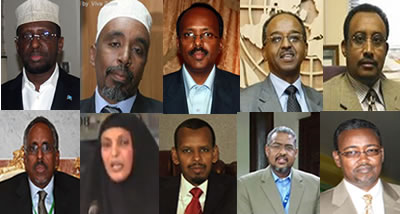Jibril Hirsi
Monday, November 22, 2010
 Somalia has the best hope of resolving its prolonged conflict with the approval of a new Somali-American Prime Minister, Mohamed Abdullahi Farmaajo and his cabinet. We all understand that the Prime Minister and his government face a wide range of obstacles and challenges. However, the steps taken so far, and the opportunities ahead of the new Prime Minister and his cabinet, offer great hope.
Somalia has the best hope of resolving its prolonged conflict with the approval of a new Somali-American Prime Minister, Mohamed Abdullahi Farmaajo and his cabinet. We all understand that the Prime Minister and his government face a wide range of obstacles and challenges. However, the steps taken so far, and the opportunities ahead of the new Prime Minister and his cabinet, offer great hope.
The Challenges:
The extremist group, Al-Shabaab, controls large swaths of southern and central Somalia. The Transitional Federal Government, in addition to its weaknesses, is hampered by internal squabbling of its top leadership. A group of corrupt parliamentarians, including the speaker, are committed to standing in the way of any progress. Various stakeholders in the Somali conflict have competing interests and want different solutions to the same problem. The most pressing challenge of all is that the TFG has lost credibility with the Somali people as well as the international community.
The First Steps:
The important steps taken so far by the new prime minister include the appointment of 18 qualified cabinet ministers and 18 assistant ministers. This number is less than half of the previous cabinet. The members of the new cabinet, some of who I know in person, were selected on the basis of merit. I strongly believe that they can offer new hope and voice for Somalia and its interests. They are people who have the knowledge, ideas, skills, connections, and courage to make a difference.
The emphasis on security is another key step forward. The Prime Minister’s visit to the front lines in Mogadishu and his commitment of support for the Somali armed forces can build the confidence of government soldiers. Building a capable Somali army is the only way of getting out of the current mess and realizing order and stability. In his blueprint to the parliament, the prime minister confirmed his dedication to securing the capital, Mogadishu, within the first 100 days of his administration by using a combination of military power and political settlement.
The Opportunities:
There are opportunities ahead for the new cabinet. First, the mandate given to President Sharif when he was selected in Djibouti last year included talking with any group that is opposed to the government- Ahlu Sunnah, Al-Shabab, Hisbul Islam, regional administrations of Puntland and Somaliland, and clan militias. The president and the former prime minister did not take advantage of this mandate. The President might be thinking that, as a former Islamist rebel leader, he could lose the support of the international community if he talked with some groups.
However, the government has the prerogative of speaking to anyone who agrees to abhor the use of violence to achieve political goals, both locally and internationally. The new administration needs to take bold steps and make huge sacrifices along the way in order to create a peaceful Somalia. This is the will of the Somali people as well as the expectation of the international community. It is difficult to affect change, but it is more difficult for the status quo to continue in Somalia. It is insane to do the same old things and expect different results.
It is up to the new government to set the pace and direction of Somalia’s destiny. Every stakeholder in the Somali conflict is looking up to the Transitional Federal Government to set and execute national and international policy for Somalia. Even in cases where a country decides to implement a new Somalia policy, the TFG has a big role to play. A relevant example is the recent U.S. dual track policy. The new policy spells out that the U.S. will continue to support the TFG (Track 1) while engaging Somali regional administrations, groups, and clans (Track 2).
Track one consists of financial, military, and diplomatic support for the TFG through the provision of AU peacekeepers, training of government forces, and provision of financial, logistics and military support. Track two is limited to providing humanitarian, diplomatic, and institutional assistance to regional administrations and groups that are against the ideologies of Al-Shabaab. The new government of Mohamed Abdullahi Mohamed Farmaajo can spearhead an effort to expand track two and solicit military help for dislocated tribal armies in Hiiraan, Bakool, Gedo, Galguduud, and Lower Jubba. By coordinating the efforts of these groups, they stand a good chance of defeating Al-Shabaab and providing leadership in resolving the Somali conflict.
In Conclusion:
Internal squabbles, corruption, and lack of visionary leadership stood in the way of building a strong Somali government for the past 20 years. We tried tribal warlords, regional warlords, and religious warlords. Now, let us give a chance to a new crop of leadership and support them to lead us in making the “transitional” period a thing of the past and building credible government institutions that work for the people of Somalia. The cycle of hiding in AMISOM tanks in the streets of Mogadishu, squabbling inside Villa Somalia, and blaming “outsiders” for Somalia’s plight must end.
Jibril Hirsi is the executive director of SomaliCAN, an advocacy and outreach organization based in the United States of America. He can be reached